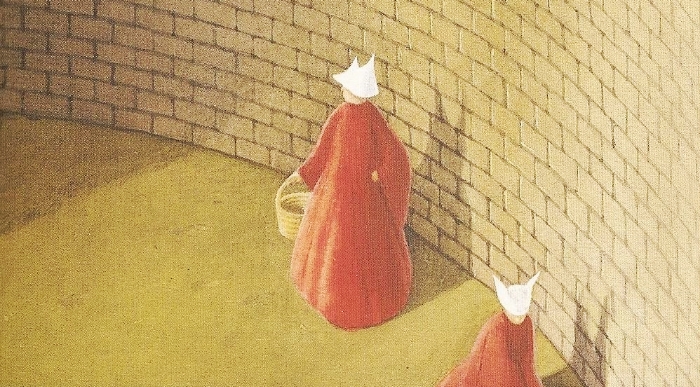You’ve likely seen a number of red-gowned women with white hats in the news recently. You might be looking at the release of Hulu’s The Handmaid’s Tale or you might be looking at protesters from Planned Parenthood. Recently, Planned Parenthood volunteers, dressed in costumes inspired by The Handmaid’s Tale, marched outside Capitol Hill in opposition of the proposed U.S. healthcare bill. But did you know that these protests, inspired by Margaret Atwood’s The Handmaid’s Tale, originated in Canada?
Five years ago, a group of activists put on red gowns and white “flying nun” hats to oppose Motion 312 on Parliament Hill. Motion 312 was intended to reopen the abortion debate by examining the question of fetal personhood. Below is an excerpt from Without Apology: Writings on Abortion in Canada that shares the story behind the Radical Handmaids.
Handmaids on the Hill
On 25 April 2012, a small grassroots group of (mostly) young women donned outfits inspired by Margaret Atwood’s 1985 novel, The Handmaid’s Tale, and went to Parliament Hill for a little “cosplay” to protest Motion 312—Conservative MP Stephen Woodworth’s attempt to reopen the abortion debate by proposing that a Parliamentary committee be established to revisit the question of fetal personhood. We called ourselves the Radical Handmaids.
[…]
Our protest took place the day before the opening debate on Woodworth’s Motion 312, on 26 April 2012. The motion was supposed to return to the House of Commons in June but was postponed until 21 September, with the vote taking place on 26 September. As expected, the motion did not pass, but ninety-one MPs—four Liberals and the rest Conservatives—voted in favour of reopening the abortion debate, including the minister responsible for the Status of Women, Rona Ambrose (who, after the election of the Trudeau-led Liberals in October 2015, became the interim leader of the Conservative Party). Woodworth’s initiative has not been, nor will it be, the only attempt to recriminalize abortion in Canada. In May 2012, another Conservative MP, Maurice Vellacott, tried to appropriate the International Day Against Homophobia and Transphobia to suggest, bizarrely, that abortion bullies the fetus in the womb.[1]
It’s tempting to regard these anti-choice proposals as little more than quaint flare-ups of an outmoded and marginal ideology. Eyebrows may be raised at the suggestion that campaigns against bullying should extend to fetuses, but no matter what’s happening south of the border, in Canada, a perception endures that the War on Women is only a silly skirmish—interesting to observe or debate but unlikely to have any real consequences for women’s lives, even with a Conservative federal government in power. Therefore, the Radical Handmaids were met with shrugs and why-bothers from some quarters. Even Margaret Atwood herself said in 2011, prior to the Conservatives’ return as a majority, that a debate on abortion ought to be had, albeit located within its proper context:
Harper says he will not allow a debate on abortion. But he should allow it. All aspects of this troublesome question—and it has been troublesome throughout history, as there are no lovely answers—should be thoroughly discussed. There should be clarity on Harper’s attitude to women and children and their well-being. Let them die of malnutrition? Supply adequate diet, public support if there’s no income, protection from rape and enforced prostitution, improved adoption procedures, education, better hospitals and access to drugs, new orphanages, enforced chastity, unwillingly pregnant women locked up in mega-jails, payment per baby if baby-making is service provided to the state, pace Napoleon? What’s it to be? Spit it out. Let us know what may be coming soon to a neighbourhood near us.[2]
Of course—and Atwood’s intention was undoubtedly to highlight this dismal reality—those whose bodies and lives are particularly vulnerable to such debates, fertile women, are condemned to watch from the sidelines. As Atwood makes clear, the problem with the view that such a debate is harmless is its dislocation from the context in which it needs to be firmly situated—the Harper Conservatives’ relentless erosion of hard-won feminist gains since their first rise to power as a minority in 2006. Looked at in this way, the attacks on reproductive rights, however silly, become not marginal but central to the steady pattern of an anti-feminist backlash. Too often, abortion rights are isolated from their intrinsic connection with the other rights that feminists have fought for. And yet those rights—including access to education, affordable child care, freedom from stifling poverty, and the ability to leave abusive partners, to name only a few—are integral to women’s ability to choose whether, when, and with whom they will have children.

Read the full chapter on our website.
Find the Radical Handmaids on Facebook and Twitter.
[1] Jennifer Ditchburn, “For Tory Backbencher, Abortion Is ‘Bullying in the Worst Degree,” Globe and Mail, 17 May 2012.
[2] Antonia Zerbisias, “Harper’s Plan Helps Women Only as Baby-makers,” Toronto Star, 29 January 2010.


